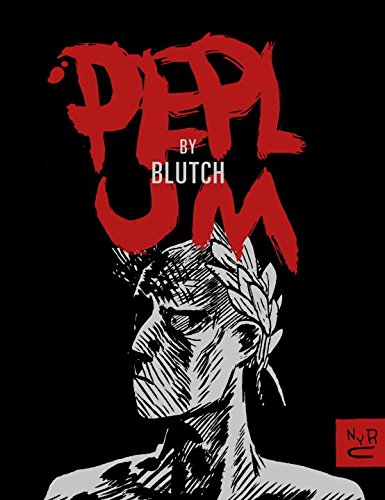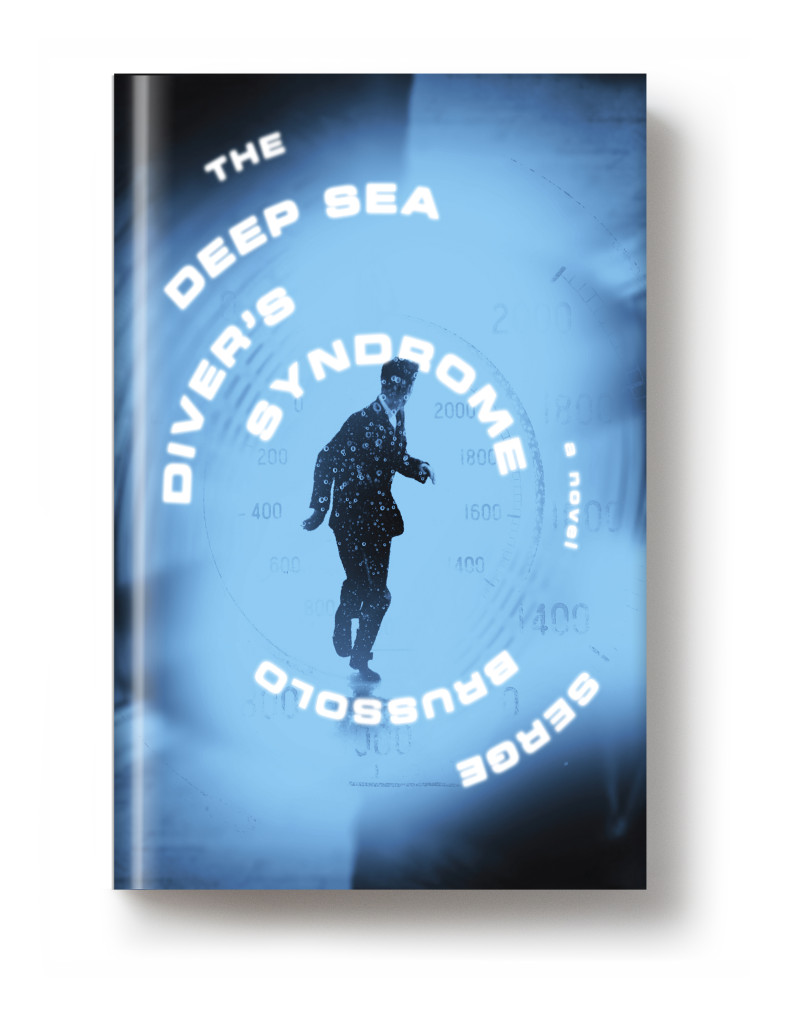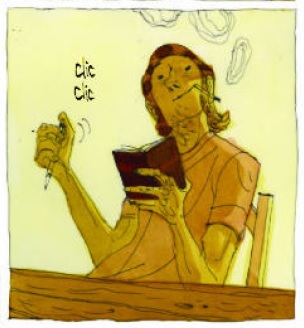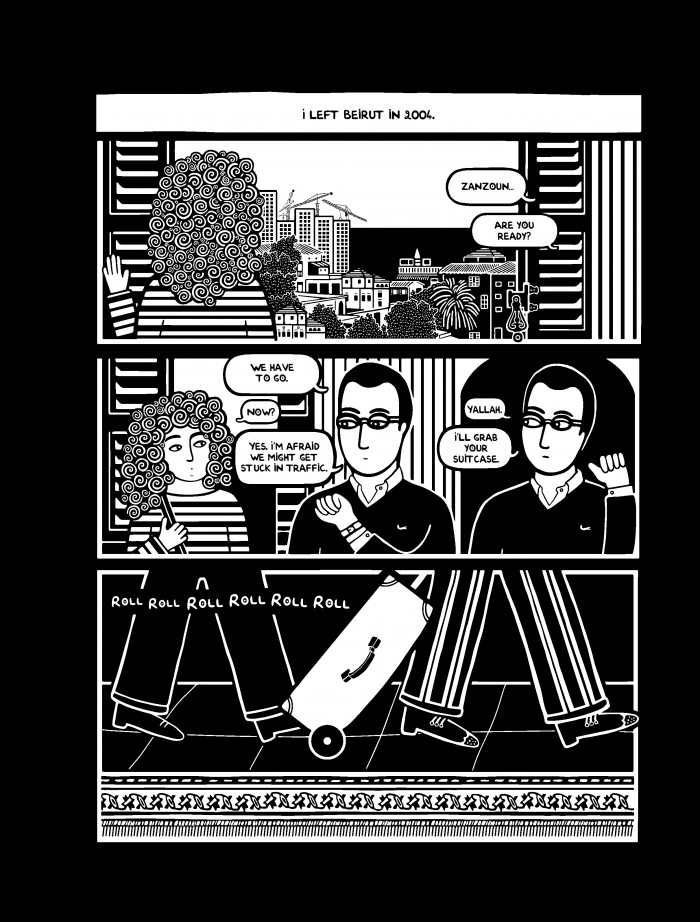April 19th, 2016 § § permalink

Reviews are rolling in for Blutch’s Peplum, and they’re terrific!
At the Onion A.V. Club, comics guru Oliver Sava calls the book
a resounding success, with a bold, eye-catching trade dress and an oversized format that allows readers to savor every little detail in Blutch’s sumptuous artwork […]
Translator Edward Gauvin does exceptional work giving the text a lyricism that matches the emotional richness of Blutch’s artwork, and Jess Johnson’s earthy lettering makes the words an organic extension of the visuals. The texture in the art is especially evocative, and Blutch gives this world a tactile quality that keeps the tone grounded as the story ventures into surreal, hallucinogenic territory […]
Peplum is an object of both beauty and terror. The artistry on display in these pages is astounding, and hopefully it won’t be another three years until more of Blutch’s library makes its way overseas.
In Canada’s own Globe and Mail, Sean Rogers says
The 1997 sword-and-sandal epic Peplum, by the furiously inky artist known as Blutch, marks the first translation in the publisher’s catalogue – and thus serves as a gauntlet thrown down with imperious conviction. Breakneck in its pacing, allusive and rich in its classical cadences (as translated by Edward Gauvin)… [f]reely adapting passages from Shakespeare’s Caesar and Petronius’s Satyricon, Blutch draws cities like Grosz, atrocities like Goya and gardens like Matisse. Peplum’s broad strokes may thus seem familiar – the hero undergoes an odyssey where he is beset by pirates, bound by barbarians, ravaged by an Amazon and tempted away from his prize by a comely boy-servant – but the execution is all Blutch’s own, confounding and febrile, like some dream version of myth.
Douglas Rednour in The Library Journal awards Peplum a starred review:
Peplum is a visual tour de force of comics language. Blutch (aka Christian Hincker) tells a surreal adventure in the manner of Petronius’s Satyricon while using the emotional body language and panel styling of Will Eisner infused with the smooth, moving line work that powered Eric Drooker’s Flood, giving the tale a bulging musculature that would fit in well with the best films of the peplum genre. In doing so, Blutch (So Long, Silver Screen) employs the comic form to craft a story with affecting legitimacy and unexpected visual combinations that make every page a new adventure without precedent or convention.
Verdict Any reader looking for a high level of comic art will find a coliseum full of riches in Peplum.
Publisher’s Weekly says
Blutch’s art is truly exquisite, rendering battles, orgies, and conversations in dense, inky lines akin to Mattotti, but completely his own and completely haunting… The book requires rereading to grasp the scope of storytelling and linework, which is effortless enough to make the greatest American cartoonists jealous.
And in the March issue of World Literature Today, D. Eddy Emerson finds much to appreciate, ruminating thematically on form and function:
[the] dichotomy between the immediacy of the artwork and the more esoteric nature of the possible narrative mirror the two forms of love that underlie the story. The artwork is the real, tactile love that could well be lost when chasing the ideal of love, while the narratives and themes presented could just be a created fiction.
April 11th, 2016 § § permalink

In the latest issue of Locus (March 2016), Faren Miller has these kind words for DSDS:
Serge Brussolo has been a well-regarded, bestselling French writer for decades, but short novel The Deep Sea Diver’s Syndrome is the first of his books to appear in English (translation by Edward Gauvin). Though it appeared in France in 1992, this surreal and powerfully original work shows how much we’ve been missing, and I hope further translations will soon follow […]
Through a vividly surreal blend of genres, The Deep Sea Diver’s Syndrome transcends familiar metaphors for the creative process, making it seem new again (with a sly tip of the hat to pulp fiction).
In the latest issue of Locus (March 2016), Faren Miller writes:
Serge Brussolo has been a well-regarded, bestselling French writer for decades, but short novel The Deep Sea Diver’s Syndrome is the first of his books to appear in English (translation by Edward Gauvin). Though it appeared in France in 1992, this surreal and powerfully original work shows how much we’ve been missing, and I hope further translations will soon follow […]
Through a vividly surreal blend of genres, The Deep Sea Diver’s Syndrome transcends familiar metaphors for the creative process, making it seem new again (with a sly tip of the hat to pulp fiction).
April 4th, 2016 § § permalink

Words Without Borders’ annual comics issue featured an excerpt from L’Étrange by Jérôme Ruillier, a deliberately eerie story of displacement and migration, done in animals, rough lines, and primary colors. It is accompanied by a preface in which I explain why I decided to render the title literally as The Strange in English. My translation of an excerpt from Ruillier’s adaptation of Les Mohameds, a famous oral history of the first wave of North African immigrants to France, featured in the same magazine a few years ago.
April 3rd, 2016 § § permalink

At 11:15 AM in Ustler Atrium, I’ll be giving one of three keynote addresses at the University of Florida’s annual Conference on Comics and Graphics Novels. The theme of this 13th  year is Transnational Comics—Crossing Gutters, Transcending Boundaries.
April 2nd, 2016 § § permalink

Looking forward to this spring, Zainab Akhtar of Comics and Cola has a column at The Guardian on graphic novels to look forward to. Blutch’s Peplum, due out in April, is one of the launch titles for New York Review Comics, New York Review of Books’ new comics imprint.
The man known as Blutch is one of the giants of contemporary comics, and Peplum may be his masterpiece: a grand, strange dream of ancient Rome. At the edge of the empire, a gang of bandits discovers the body of a beautiful woman in a cave; she is encased in ice but may still be alive. One of the bandits, bearing a stolen name and with the frozen maiden in tow, makes his way toward Rome—seeking power, or maybe just survival, as the world unravels.
Thrilling and hallucinatory, vast in scope yet unnervingly intimate, Peplum weaves together threads from Shakespeare and theSatyricon along with Blutch’s own distinctive vision. His hypnotic storytelling and stark, gorgeous art pull us into one of the great works of graphic literature, translated into English for the first time.
“Blutch is a master. No other cartoonist renders with such casual virtuosity. It’s long overdue for his books to be translated into English.†—Craig Thompson
“One of our greatest artists.†—L’Express“In the hands of the amazing Mr. Hincker (who uses the pseudonym Blutch), a simple pencil takes on the qualities of a magic wand.†—
The New York Times
“One of the greatest living cartoonists (and if you don’t think Blutch fits this bill you really, really need to read more Blutch).â€â€”The Comics ReporterÂ
“One of the most important European cartoonists of the past 20 years.â€â€”Robot 6
Blutch (Christian Hincker) is an award-winning, highly influential French cartoonist. He has published almost two dozen books since his 1988 comic debut in the legendary avant-garde magazine Fluide Glacial, including Mitchum, Le Petit Christian, and So Long, Silver Screen, his only previous book to be published in English. His illustrations appear in Les Inrockuptibles, Libération, and The New Yorker.
April 1st, 2016 § § permalink

Words Without Borders’ annual comics issue featured an excerpt from Le piano oriental by Zeina Abirached, of A Game for Swallows fame. Serialized online in its entirety at the French newspaper Le Monde, Abirached’s work tells a playful and complex intergenerational tale of music and migration. This  excerpt tells the story of how she left home for Paris for the first time.




